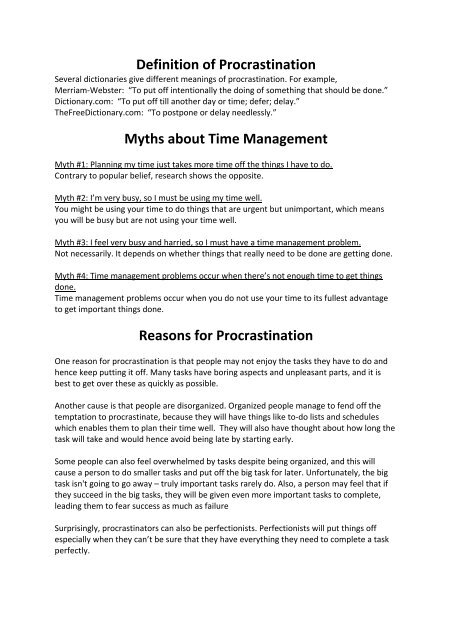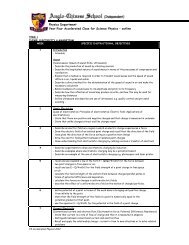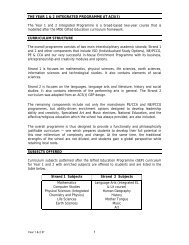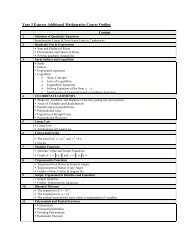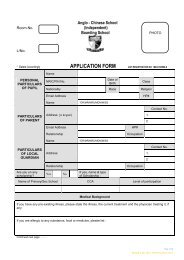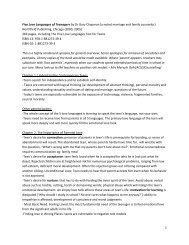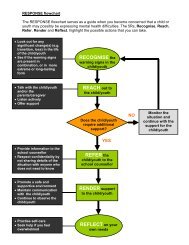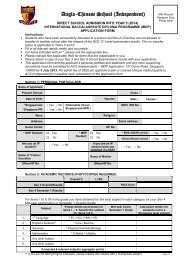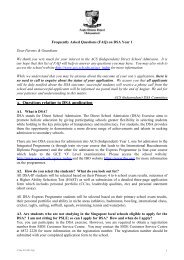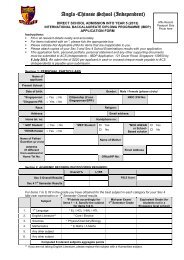Definition of Procrastination Myths about Time Management ... - Sites
Definition of Procrastination Myths about Time Management ... - Sites
Definition of Procrastination Myths about Time Management ... - Sites
Create successful ePaper yourself
Turn your PDF publications into a flip-book with our unique Google optimized e-Paper software.
<strong>Definition</strong> <strong>of</strong> <strong>Procrastination</strong>Several dictionaries give different meanings <strong>of</strong> procrastination. For example,Merriam‐Webster: “To put <strong>of</strong>f intentionally the doing <strong>of</strong> something that should be done.”Dictionary.com: “To put <strong>of</strong>f till another day or time; defer; delay.”TheFreeDictionary.com: “To postpone or delay needlessly.”<strong>Myths</strong> <strong>about</strong> <strong>Time</strong> <strong>Management</strong>Myth #1: Planning my time just takes more time <strong>of</strong>f the things I have to do.Contrary to popular belief, research shows the opposite.Myth #2: I’m very busy, so I must be using my time well.You might be using your time to do things that are urgent but unimportant, which meansyou will be busy but are not using your time well.Myth #3: I feel very busy and harried, so I must have a time management problem.Not necessarily. It depends on whether things that really need to be done are getting done.Myth #4: <strong>Time</strong> management problems occur when there’s not enough time to get thingsdone.<strong>Time</strong> management problems occur when you do not use your time to its fullest advantageto get important things done.Reasons for <strong>Procrastination</strong>One reason for procrastination is that people may not enjoy the tasks they have to do andhence keep putting it <strong>of</strong>f. Many tasks have boring aspects and unpleasant parts, and it isbest to get over these as quickly as possible.Another cause is that people are disorganized. Organized people manage to fend <strong>of</strong>f thetemptation to procrastinate, because they will have things like to‐do lists and scheduleswhich enables them to plan their time well. They will also have thought <strong>about</strong> how long thetask will take and would hence avoid being late by starting early.Some people can also feel overwhelmed by tasks despite being organized, and this willcause a person to do smaller tasks and put <strong>of</strong>f the big task for later. Unfortunately, the bigtask isn't going to go away – truly important tasks rarely do. Also, a person may feel that ifthey succeed in the big tasks, they will be given even more important tasks to complete,leading them to fear success as much as failureSurprisingly, procrastinators can also be perfectionists. Perfectionists will put things <strong>of</strong>fespecially when they can’t be sure that they have everything they need to complete a taskperfectly.
One final major cause <strong>of</strong> procrastination is poor decision‐making. If you are unsure <strong>of</strong> howto start or what to do next, you are likely to be afraid you will do something wrongly andleave the tasks for another time.Source: http://www.mindtools.com/pages/article/newHTE_96.htmBiggest <strong>Time</strong> Wasters1. Interruptions. There will always be interruptions. It’s how they’re handled thatwastes time.2. Hopelessness. People “give in”, “numb out” and “march through the day”.3. Poor delegation skills. This involves not sharing work with others.Recognizing <strong>Time</strong> <strong>Management</strong> ProblemsHere are some ways to tell if you areprocrastinating:• Doing all your low priority taskson your to‐do list first.• Reading instructions severaltimes without beginning to doanything or trying to decidewhat to do.• Resolving to start an importanttask and then immediately goingto do something else.• Having an item perpetually onyour to‐do list even though it’simportant.• Agreeing to do mundane things http://wishful.fileburst.com/creativetime.pdfothers ask you to do and filling yourday with those instead <strong>of</strong> doing the more important tasks• Waiting for the right mood or the right time to tackle the important task at hand.Solutions to <strong>Time</strong> <strong>Management</strong> ProblemsPrioritizationPrioritization is making the best use <strong>of</strong> your time and resources. Prioritization is essential inensuring that you make the best use <strong>of</strong> your efforts and the efforts <strong>of</strong> those you are workingwith. It is also important when you are lacking time to complete certain tasks, as it enablesyou to ensure the most important things get done first. There are two effective ways to dothis.Listing:Listing can be used when you have a diverse array <strong>of</strong> tasks to complete. After listing out all
the tasks to be completed, you can then measure the importance <strong>of</strong> each task against everyother task in the list and obtain a prioritized list in which you can see what to do first.Plotting a graph:By categorizing tasks according to their valueand pr<strong>of</strong>it as well as the time and effort theywill take, you can find those tasks that take littletime but hold great value and finish them first,leaving those that require much effort but holdlittle value for last.Alternatively, you can plot importance againsturgency and find tasks that are both importantand urgent to do first, and leave theunimportant and non‐urgent tasks to last.SchedulingScheduling is a way to help you to place down what you need to achieve as well as a way toprioritize the tasks. A schedule should be planned on a regular basis in order to be mosteffective.First, you must identify the time you have available which does not include eating andsleeping and “housekeeping”. Following that, decide when you will do the tasks thatabsolutely need to get done. Remember that for important tasks you will <strong>of</strong>ten need someextra time just in case you encounter a problem.After factorizing in all tasks that must be done, you should be left with “unused time”. Thisis where you list <strong>of</strong> priorities can be used – start from the tasks with highest priority, fill inyour schedule. Remember that a schedule is useless unless you adhere to it, so try your bestto keep to you schedule, and don’t procrastinate.How to Combat <strong>Procrastination</strong>In order to combat procrastination, you must first understand why you are procrastinating.See the section on Reasons for time management problem above.Otherwise, let’s get started on how to get yourself started:• Try rewarding yourself for completing certain tasks that you have been putting <strong>of</strong>f.• Get someone to remind you/check up on you. This will help you not to forget to dowhat you need to do and also adds good pressure.• Think <strong>about</strong> the unwanted consequences <strong>of</strong> not doing a task.• If you feel that the task at hand is boring and unpleasant, try to start doing some <strong>of</strong> it– it usually isn’t so bad after all.• If the task seems overwhelming, try to break it up into smaller, manageable parts.• Try to start on your task by finding an easy part to do. It is usually much easier tocontinue once you have started than to actually begin.
Managing Studying <strong>Time</strong>If you have a problem studying effectively, you might want to think <strong>of</strong> better ways or placesor times to study. In order to better manage the time you spend on your work and study, trythese:• Study in blocksTry to study for a predetermined amount <strong>of</strong> time, such as an hour or half an hour,and then take a break for five to ten minutes, returning to your work after that. Thisway, you won’t get bored and tired so fast, which will maximize your time.• Get a dedicated study spaceFind a place to study away from the TV and the computer where distractions will beminimal. When studying, try keeping your handphone and game consolessomewhere else in order to prevent distractions. For example, you could head to thelibrary or a c<strong>of</strong>fee shop nearby.• Review notes just after classThe first 24 hours after your class is a good time to review as it will help you toremember more <strong>of</strong> what you have learned more accurately• Use free time wiselyMany small bits <strong>of</strong> time can be used every day – for example, while on the bus, whilewalking or while in a queue. These small bits <strong>of</strong> time can be used to review notes andfree up more time.Sourceshttp://www.stopprocrastinating.net/procrastination‐definitionhttp://www.managementhelp.org/prsn_prd/basics.htmhttp://www.studygs.net/timman.htmhttp://www.mindtools.com/pages/article/newHTE_96.htmhttp://www.mindtools.com/pages/article/newHTE_92.htmhttp://www.mindtools.com/pages/article/newHTE_07.htmExternal Linkshttp://www.teal.org.uk/sv/timemgnt.htmhttp://en.wikipedia.org/wiki/<strong>Time</strong>_managementhttp://www.dartmouth.edu/~acskills/success/time.htmlhttp://www.d.umn.edu/kmc/student/loon/acad/strat/time_manage.htmlhttp://www.lc.unsw.edu.au/onlib/pdf/time.pdfhttp://www.time‐management‐solutions.com/http://www.collegeboard.com/student/plan/college‐success/116.html


